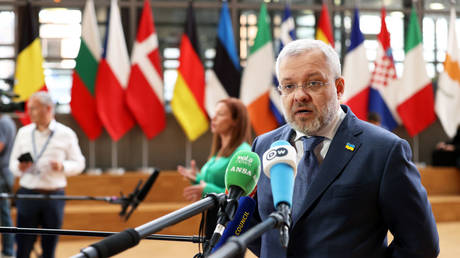Ukraine Plans to Halt Transit of Russian Gas to the EU
Kiev has announced it will halt the transmission of Russian gas through its pipelines starting January 1, coinciding with the expiration of an agreement with Russia's Gazprom.. source:TROIB RTS

The existing gas transit agreement between Moscow and Kiev is set to expire on December 31, and Ukrainian officials have consistently indicated that they do not intend to renew it.
Despite significant reductions in supplies due to sanctions imposed on Moscow, several EU countries still depend on Russian gas, even as Brussels pushes to sever its energy ties with Russia.
During the German-Ukrainian Business Forum in Berlin on Wednesday, Galushchenko discussed Ukraine's readiness to cease gas transits. "Our position is completely open. We are preparing for zero transit from January 1. And we have been [preparing] for a long time. This year alone we conducted several stress tests for our gas system to see how it will function with zero transit,” he stated, as reported by the Ukrinform news agency.
The transit agreement between Ukraine's state energy firm Naftogaz and Russia's energy giant Gazprom was established in 2019. At the time, Naftogaz regarded the deal as a means to secure the domestic gas market, noting that Gazprom had paid nearly $3 billion for transit services, ensuring the Ukrainian system could operate without financial losses for five years.
Ukraine’s transit network connects with the pipeline systems of Moldova, Romania, Poland, Hungary, and Slovakia. As per the latest data, approximately 5% of the EU's gas still comes from Russia via Ukraine.
The Naftogaz transit system and the European segment of TurkStream are currently the only channels for piped Russian gas to reach central and southern Europe. The TurkStream pipeline transports gas from Russia to Türkiye via the Black Sea and then extends to the EU member Greece's border.
Russia has expressed a willingness to continue its gas deliveries beyond 2024. In October, Gazprom CEO Aleksey Miller cautioned that refusing Russian gas would amount to “energy suicide” for the EU. He predicted that the bloc's policies might lead to further deindustrialization, increased gas market volatility, and potential gas price shocks and supply interruptions.
Similar concerns have been echoed by Hungary and Slovakia, the EU nations most reliant on Russian gas. Notably, Budapest receives over half of its gas consumption from Russia under a 15-year contract with Gazprom established in 2021.
In response to the situation, options have been suggested that involve increasing reliance on TurkStream and sourcing additional supplies from Azerbaijan for transit to the EU through Ukraine.
Allen M Lee contributed to this report for TROIB News
Find more stories on Business, Economy and Finance in TROIB business












